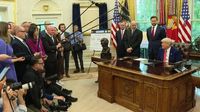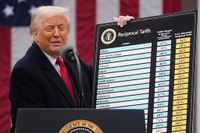In a significant development for international trade, President Donald Trump announced a landmark trade deal with the United Kingdom on Thursday, May 8, 2025. This agreement marks the first major trade pact for his administration since the imposition of sweeping tariffs in early April. During a press conference in the Oval Office, Trump declared the US-UK trade agreement a "great deal for both countries," emphasizing that it would enhance US export markets for agricultural products, including beef and ethanol.
"The deal includes billions of dollars of increased market access for American exports, especially in agriculture, dramatically increasing access for American beef, ethanol and virtually all of the products produced by our great farmers," Trump stated, highlighting the potential benefits for American producers.
UK Prime Minister Keir Starmer, who joined Trump via phone, echoed the sentiment, calling it a "fantastic, historic day." The agreement is seen as a pivotal moment for the UK, particularly as it seeks to navigate its post-Brexit trade landscape.
However, the deal comes with caveats. According to Commerce Secretary Howard Lutnick, the UK will still face a universal 10% tariff on its exports to the US. Additionally, while the US will reduce the 25% sectoral tariffs on most foreign automobiles to 10%, it will eliminate tariffs on steel exports altogether. These adjustments aim to foster a more balanced trade relationship between the two nations.
As the US and UK celebrate this newfound partnership, the European Union has taken a contrasting approach. On the same day, the EU unveiled a list of US products that could be subjected to tariffs should trade negotiations with the US falter. This list includes over $100 billion worth of US goods, marking a significant escalation in the ongoing trade tensions.
While the US-UK deal has sparked optimism in the markets, with US stocks jumping to session highs following the announcement, questions remain about its long-term implications. The tech-heavy Nasdaq Composite rose approximately 1.8%, while the S&P 500 and Dow Jones Industrial Average each climbed around 1.4%. Notably, Boeing's stock surged by 4% in response to a $10 billion procurement deal for British airport engines.
Despite the positive news from the UK, the Trump administration is also grappling with complex negotiations with China. Treasury Secretary Scott Bessent and US Trade Representative Jamieson Greer are scheduled to meet with Chinese counterparts this weekend in Geneva. Trump hinted at the possibility of lowering the 145% tariffs on Chinese goods if negotiations proceed positively. "We're going to see," he remarked, acknowledging the precarious nature of the ongoing discussions.
In a broader context, the Federal Reserve has been monitoring the economic impact of Trump's trade policies. Fed Chair Jerome Powell noted that while sentiment has deteriorated, the tariff "shock hasn't hit yet," as the central bank opted to hold interest rates steady. The Fed's decision reflects a cautious approach as it assesses the potential disruptions tariffs may cause to the economy.
Further complicating matters, the UK recently sealed a separate trade agreement with India, described as a "landmark" deal after three years of negotiations. This move underscores the shifting dynamics in global trade as countries seek to solidify their economic partnerships in the wake of uncertainty stemming from US policies.
Back in the US, the auto industry is bracing for the repercussions of Trump's tariffs. Ford has warned that the new tariffs could result in a $1.5 billion hit to its 2025 earnings. Similarly, Toyota has projected a 21% decline in its full-year operating profits, amounting to a $1.3 billion loss over just two months. These figures highlight the significant strain that tariff policies are imposing on major manufacturers.
In light of these developments, companies across various sectors are reevaluating their strategies. For instance, Mattel has indicated that it may need to raise prices on some products due to an estimated $270 million in added input costs stemming from tariffs. This trend of price hikes is becoming increasingly common as firms navigate the challenges posed by the evolving tariff landscape.
As President Trump continues to advocate for aggressive trade policies, the repercussions are being felt not just in the US but globally. The uncertainty surrounding trade agreements has prompted many businesses to adopt a cautious approach, with some even pivoting away from reliance on US markets.
"If you are a smart, savvy business person, you are not going to jump right back into another arrangement where you are totally reliant on a U.S. partner," stated Mike Chisholm, a consultant for Canadian exporters. This sentiment reflects a growing concern among businesses about the stability of trade relations under Trump's administration.
As the dust settles on the US-UK trade agreement, the focus will undoubtedly shift to how this deal will influence future negotiations with other countries, particularly in light of the EU's recent threats and ongoing talks with China. The coming weeks will be critical as the implications of these trade policies unfold on the global stage.
In summary, the US-UK trade deal represents a significant step for Trump's administration, offering potential benefits for American exporters while also highlighting the complexities of international trade relations. As negotiations with other nations continue, the economic landscape remains fraught with uncertainty, making it imperative for businesses and policymakers alike to navigate these turbulent waters with care.





